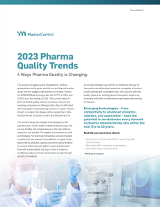
GxP Lifeline
Pharma Quality Management Trends: Adopting Intelligent Solutions

New technology is traditionally considered to be disruptive and often meets with financial, operational, training, and adoption resistance. In the case of artificial intelligence (AI), however, this new technology is seen as a business driver rather than a cost liability – even in downturns.1 Pharmaceutical industry trends reveal mentions of AI in pharmaceutical company filings increased 105% between 2016 and 2021.2
The value of AI was proven by the unprecedented rates of safe and effective vaccines developed at the peak of the COVID-19 crisis. “It took 300 days from identifying the coronavirus genome to the first vaccine study, which has previously taken an average of eight to 10 years,” according to Subroto Mukherjee, head of innovation and emerging technology, Americas at GlaxoSmithKline Consumer Healthcare.3
The Context: Optimizing Pharma Quality Management Data and Design
AI is a special breed of emergent technology. By definition, its value increases over time as it learns from existing data and patterns and then optimizes them. Further, AI can tap into “dark” data and offer predictive insights that were not previously available, despite the vast amounts of data generated by digitization and automation characteristic of Industry 4.0. The sheer quantity of data that has been produced correlates with the proliferation of AI technology. This data is key to efficient evidence-based pharma quality management processes and preferred distributed quality methods, such as quality by design (QbD). Not surprisingly, life and medical sciences companies accounted for 16% of European AI-related patent filings in 2022 – the largest share of any technology sector.”4
This is not to say that AI doesn’t bring with it some concerns, including ethical ones. However, when we understand what AI is, its intended usage, and the required monitoring that goes with it, these fears are generally resolved. AI can be characterized as a human-centric technology when it is understood that:
- AI is code developed by humans to optimize human talent and processes by copying human capabilities.
- The intention is to improve performance of and relieve the burdens that human laborers operate under.
- Human actors are key to AI technology all along the way, starting with developing the code, overseeing machine learning and training with accurate data sets, and ultimately monitoring the technology and redirecting it over time.
The Shift: Embedding AI in Quality Management Systems
As we reach the fullest expression of Industry 4.0, AI technology presents a bridge to the Industry 5.0 revolution, which is rolling out to offset the dehumanizing aspects of robotics and automation. Instead of acting as a human replacement, AI is a human accelerator, developed by humans for humans. Further, AI solutions are enabling hyper-personalized products and care. For example, some companies are using it in the laboratory to predict how proteins fold into 3D shapes in order to discover the mechanisms that drive disease and pave the way for designer medicines that can target individual and shared genetic patterns.5
There are two themes to keep in mind with the proliferation of AI technology in pharma quality management:
- Predictivity. At the heart of this transformation is an important shift from event-driven, reactive, and experience-based quality management toward data-driven, predictive, and evidence-based practices.6
- Differentiation. You should have already adopted AI technology yesterday. Today you should be using AI in quality management to differentiate.7
The Way: Laying Digital Foundations for Intelligent Outcomes
Regardless of how close you are to implementing AI technology solutions, you can keep up with pharmaceutical industry trends and begin to lay the necessary foundations in three practical ways:
- Invest in electronic records.
- Identify the most critical needs and opportunities.
- Update your standard operating procedures (SOPs).
Intelligent solutions require established data sets that can form the basis of machine learning (ML) and other AI technologies. The data must be accurate and complete – and digitally accessible. An electronic quality management system (eQMS) can be used to collect data, eliminate manual transcription errors, and flag missing or incorrect data.
It’s not possible for most companies to acquire or develop comprehensive AI solutions from the start. As soon as you lay the groundwork with an eQMS, however, you can begin to use your quality management data to show the value of AI and see where to embed it. When comparing solutions, look to a forward-looking eQMS that is designed to incorporate AI technology, for example, MasterControl’s Quality Excellence solution.
Several aspects of pharmaceutical quality management will be affected by AI developments – not the least of which will be SOPs. Document management forms the basis of any compliant QMS, and this is where AI in quality management may first appear for most organizations. Even before AI can be embedded directly into electronic record data structures or intelligently manage document control processes, you can update your actual procedures to reflect the latest regulations impacted by AI, such as the Strengthening American Cybersecurity Act.8
Conclusion
There are obstacles that companies face when considering or implementing AI technology. Some of them are practical and others are mental. For example, companies with missing or incomplete data, or unstructured data locked up in paper documents or narrative electronic formats, such as PDF, will not be able to implement AI technology until historical data can be collected, “cleaned,” and established for a period of two to three years.9 This is where an eQMS can be invaluable. Other companies may cite an unskilled workforce or don’t yet know how to leverage legacy systems. Either way, delays in adopting AI technology will cost more down the road when increasing inflation and innovation rates will make it more difficult for life sciences companies to keep up with their digitally mature peers who are already reaping the predictive benefits of established data sets and intelligent quality systems.
For more information about differentiating with AI in quality management and other trends in the pharmaceutical industry, download the free trend brief, “2023 Pharma Quality Trends: 4 Ways Pharma Quality is Changing,” from MasterControl.
References:
- "Despite recession fears, companies aren’t pulling back on technology investments,” By Susan Caminiti, CNBC, July 1, 2022.
- "Embracing digitalization in the pharmaceutical supply chain,” By Miranda Mclaren, Pharmaceutical Technology, July 25, 2022.
- "The Increasing Use Of AI In The Pharmaceutical Industry,” Kathleen Walch, Forbes, December 26, 2020.
- "UK: AI In the Pharmaceutical Industry,” Phillip Bennett and David Lang, Mondaq, April 3, 2021.
- Supra note 3.
- Supra note 2.
- "The art of AI maturity: Advancing from practice to performance,” Accenture, accessed September 9, 2022.
- "Strengthening American Cybersecurity Act Of 2022,” Zenus Franklin and Scot Ganow, Mondaq, April 11, 2022.
- Supra note 3.

